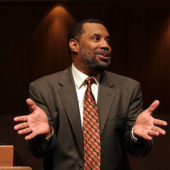The cover story in the January/February issue of Christianity Today is entitled “Stop Worrying about the Millennials” by Andrew Root.
At first, as you can imagine because of the nature of this blog, I was skeptical.
Was this going to be just another article downplaying the significance of young people in the church, saying we should just act like Millennials are no different and go on with our lives?
I thought it was going to be something like that. And it kind of is, but in a good way.
The Problem of Millennial Anxiety
Root writes that the church has to deal with its Millennial anxiety.” He defines Millennial anxiety as
“The fear that those between ages 18 and 25 have little interest in the church, and that the church has failed to convince them to stay.”
It’s natural for the church to want to reach young people, and that’s not a problem.
Smoke machines and coffee bars cannot comfort the broken Millennial, but the love of God and community of faith can.
The problem with Millennial anxiety is this: when you focus too much on one people group—defined by age, ethnicity, or otherwise—you’re bound to major on minor issues and ostracize other people groups in hopes of reaching your pet people group.
An overemphasis on Millennial ministry will almost certainly result in a blow to Boomer ministry, or even Gen-X ministry.
Reaching Millennials is important, but not to the detriment of others in your church. Do what you can to understand the young people in your community, but don’t forget about everyone else, including those younger than Millennials.
Millennials must not be the future of your church because if Millennials are the future of your church, you’re only delaying the anxiety to the next generation.
The Future is Not Millennials, the Future is Disciples
The future of your church must not be Millennials, it must be disciples.
When the road gets hard, the Millennials in your church must fall back on the grace of God not the gimmicks of the church.
If you spend the next five years throwing a bunch of resources at the Millennial generation, you’ll finally reach them just in time to turn your attention to Generation Z, the generation following the Millennials.
Generational ministry can be a cruel temptress if you let it control you.
Do not focus on reaching Millennials and catering to their every whim.
Focus on making disciples of your young people, your middle aged people, and your older people.
Disciples are the future of your church. Not Millennials. Not Gen-Zers.
God isn’t looking for Millennials in glory any more than he’s looking for Boomers or Gen-Zers.
A Millennial who you “kept in church” without disciplining is no more appealing to God than a Millennial who skipped church and wasn’t discipled.
An overemphasis on Millennial ministry will almost certainly result in a blow to Boomer ministry
Reach Millennials with the love and grace of God, not the lights and sounds of your worship experience.
Smoke machines and coffee bars cannot comfort the broken Millennial, but the love of God and community of faith can.
When the road gets hard, the Millennials in your church must fall back on the grace of God not the gimmicks of the church.
The responsible church does not unnecessarily cater to the whim of the Millennial, but it does understand the Millennial.
Understand Millennials. Don’t Worship Them
Millennial anxiety is an unfortunate by-product of a posture of wisdom.
It is wise for the local church to better understand the young people in its community and the culture they create. It is unwise, however, to let the generational culture of the community control the gospel culture of the church.
Reading books about Millennials, blogs about Millennials, or stats about Millennials is wise. It is good and right to understand the people around you.
Frantically changing worship styles and biblical interpretations to pander to the preferences of the young, however, is idolatrous.
A church in a college town is as responsible to understand the culture of the students surrounding it just as much as a church in an African village is responsible to understand the culture of the villagers surrounding it.
It is unwise to let the generational culture of the community control the gospel culture of the church.
To blow off the Millennial generation as wholly irrelevant is irresponsible.
To make Millennials wholly important to the mission of your ministry is irresponsible.
Understand Millennials. Don’t worship them.
My hope is to just help along the way.
This post was originally published on millennialevangelical.com



















